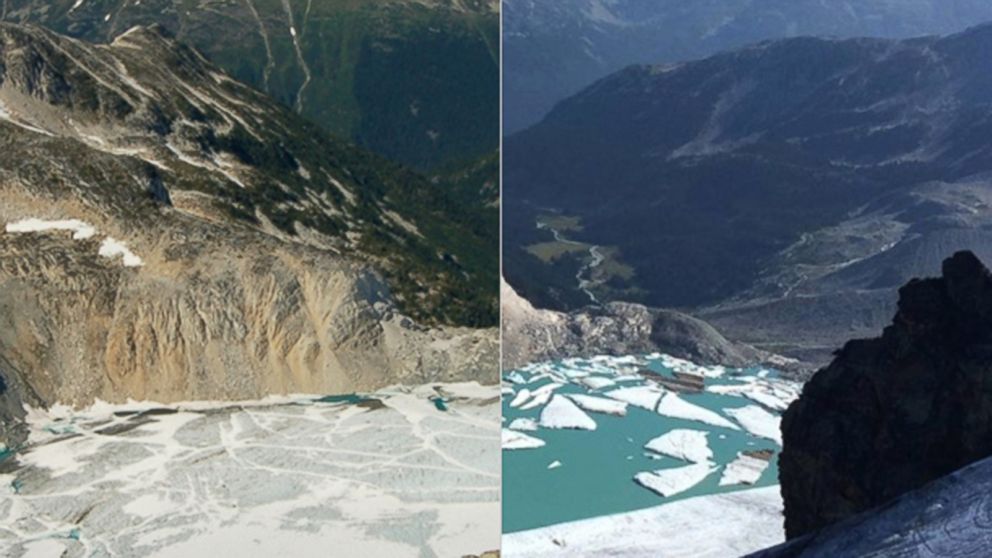Thousands of glaciers in the Canadian West could shrink by 70 percent over the next century, according to a new study published in Nature Geoscience. The research represents a new way of predicting glacier depletion that has implications for scientists across the globe, especially in South America and Asia where glacial melt is expected to hit hardest.
“We’re hoping to pass off this work to other scientists in those regions,” said Garry Clarke, lead author of the study and professor emeritus of glaciology for the University of British Columbia.
Whereas previous studies on glacial melt primarily focused on the snowpack that replenishes glaciers, Clarke’s study focuses on how glaciers break up overtime and where their water will flow under four climate scenarios outlined by the Intergovernmental Panel on Climate Change in 2014.
The study, which was published Monday after taking a decade to complete, predicts many of Canada’s glaciers will disappear entirely, claiming “few glaciers will remain in the Interior and Rockies region” and those in northwestern British Columbia will only “survive in a diminished state.”
SCROLL DOWN FOR A LOOK AT NORTH AMERICA'S VANISHING GLACIERS
The retreat of mountain glaciers, which the scientific community generally asserts is caused by human-caused climate change, is a significant contributor to sea-level rise, and has potential implications for “aquatic ecosystems, agriculture, forestry, alpine tourism and water quality,” according to the study.
“The glaciers don’t respond to the weather, they’re responding to the climate,” Clarke said. “So if you want an objective measure of the climate the glaciers are telling us.”
The study’s findings come as Canada’s Prime Minister Stephen Harper backpedals on Canada’s environmental and climate commitments made during his predecessors tenure. Under Harper, Canada has slashed funding for conservation research, amended or repealed nearly two dozen environmental laws, and became the only participant to summarily withdraw from the emissions-cutting Kyoto Protocol in 2011.
In February, activists opposing controversial tar sands development in Alberta stormed the Toronto Stock Exchange demanding fossil fuel divestment. Later that month, a leaked intelligence assessment by the Royal Canadian Mounted Police revealed that police were being instructed to treat climate activists as terrorists that comprised a “growing and violent threat to Canada’s security.”
“I am not impressed by the present government approach to dealing with the climate question,” Clarke said, adding that the government had “suppressed the scientific community” and pointing to the Harper administration’s refusal to renew funding for the Canadian Foundation for Climate and Atmospheric Sciences when funds ran out in 2011.
\"Our Government is taking action to protect the environment by expanding the network of national parks, conserving Canada’s natural heritage through our National Conservation Plan and reducing greenhouse gas emissions,\" Shane Buckingham, spokesperson for Environment Minister Leona Aglukkaq, said in a statement to ABC News.
\"We are achieving emissions reductions through our responsible sector-by-sector regulatory approach, which is aligned with our major economic competitors – like the United States – to ensure Canada's economic competitiveness is protected,\" Buckingham said.
Canada’s government has invested $10 billion in green infrastructure projects and focused on regulating electricity, transportation, and coal plants, in an effort to reduce greenhouse gases but environmental activists argue the sector by sector approach lacks an overall implementation plan designed to reach the country’s goal of a 17 percent emissions reduction by 2020.
“Harper’s support for tar sands expansion and Arctic drilling run contrary to scientific evidence of a changed climate,” Farrah Khan, Arctic Campaigner for Greenpeace, said of two activities that contribute to climate-changing greenhouse gases.
","publishedDate":"2015-04-07T18:08:00Z","contributors":[{"name":"ABC News","url":"","role":"","logo":"","logoAlt":""}],"modifiedDate":"2015-05-07T20:16:57Z","section":"International","wordCount":619,"relatedTags":{"heading":"Related Topics","tags":[]},"lead":{"ratio":"16x9","disableForMobile":false,"type":"xl","mediaType":"image","alignCaptionToBody":true},"ads":{"Sticky":{"kvps":{"test":true}},"RightRail":{"kvps":{"test":true}},"InlineBox":{},"InlineOutstream":{"disabled":false},"Taboola":{"position":"bottom","pageType":"article","config":{"network":"abcnews-abcnews","mode":"thumbnails-a","container":"taboola-below-article-thumbnails","type":"article","targetType":"mix","placement":"Below Article Thumbnails"}}},"featuredVideo":null,"featuredImage":{"caption":{"credit":"Jason Krupa/USGS","text":"Decker Glacier at Whistler, British Columbia, Canada is pictured in July 2006, left, and Aug. 2014, right.","lines":2},"image":{"alt":"Decker Glacier at Whistler, British Columbia, Canada is pictured in July 2006, left, and Aug. 2014, right.","src":"https://s.abcnews.com/images/International/ht_glacier_split_main_kab_150407_16x9_992.jpg?w=1600","sources":[{"min":0,"max":374,"src":{"x1":"https://s.abcnews.com/images/International/ht_glacier_split_main_kab_150407_16x9_992.jpg?w=384"}},{"min":375,"max":693,"src":{"x1":"https://s.abcnews.com/images/International/ht_glacier_split_main_kab_150407_16x9_992.jpg?w=608"}},{"min":694,"src":{"x1":"https://s.abcnews.com/images/International/ht_glacier_split_main_kab_150407_16x9_992.jpg?w=1600"}}],"fetchPriority":"high"}},"dateline":"—","seo":{},"LivePromotion":{}},"autoUpdate":{"enabled":false,"topics":["general-elections-2020-balance-of-power"]}},"upw":{"balanceOfPower":{"electoral":{"header":"Biden Projected to be President-Elect","candidates":{"democrats":{"id":1036,"displayName":"Joe Biden","shortDisplayName":"J. Biden","firstName":"Joe","lastName":"Biden","party":"democrats","major":true,"incumbent":false,"winner":true,"votes":306},"republicans":{"id":8639,"displayName":"Donald Trump","shortDisplayName":"D. Trump","firstName":"Donald","lastName":"Trump","party":"republicans","major":true,"incumbent":true,"winner":false,"votes":232},"other":{"displayName":"Other","votes":0}},"parties":{"democrats":"democrats","republicans":"republicans"},"type":"electoral","votes":{"democrats":{"available":{},"total":306,"difference":{},"popular":{"displayValue":"81,283,098","value":81283098}},"republicans":{"available":{},"total":232,"difference":{},"popular":{"displayValue":"74,222,958","value":74222958}},"other":{"available":{},"total":0,"popular":{}},"total":538},"needed":{"displayText":"270 to win","displayValue":"270","value":270},"lastUpdated":{"value":"2020-12-18T21:15:13.850Z","displayValue":"December 18, 4:15:13PM ET"},"reporting":"99% of Expected Vote Reporting"},"senate":{"header":"Senate Seat Results","candidates":{"democrats":{"displayName":"Democrats","icon":"party-democrats","votes":46,"winner":false},"republicans":{"displayName":"Republicans","icon":"party-republicans","votes":50,"winner":false},"other":{"displayName":"Other","votes":2}},"parties":{"democrats":"democrats","republicans":"republicans"},"type":"senate","votes":{"democrats":{"available":{"displayText":"12 Democrats up for election","shortDisplayText":"12 Dems. up for election","displayValue":"12","value":12},"total":46,"difference":{"displayText":"Gained 1 seat","displayValue":"1","value":1},"popular":{}},"republicans":{"available":{"displayText":"23 Republicans up for election","shortDisplayText":"23 Reps. up for election","displayValue":"23","value":23},"total":50,"difference":{"displayText":"Lost 1 seat","displayValue":"-1","value":-1},"popular":{}},"other":{"available":{"displayText":"0 Others up for election","shortDisplayText":"0 Others up for election","displayValue":"0","value":0},"total":2,"popular":{}},"total":100},"needed":{"displayText":"51 for control","displayValue":"51","value":51},"lastUpdated":{"value":"2020-12-17T18:22:05.390Z","displayValue":"December 17, 1:22:05PM ET"}},"house":{"header":"House Results: Dems Retain Control","candidates":{"democrats":{"displayName":"Democrats","icon":"party-democrats","votes":222,"winner":true},"republicans":{"displayName":"Republicans","icon":"party-republicans","votes":210,"winner":false},"other":{"displayName":"Other","votes":0}},"parties":{"democrats":"democrats","republicans":"republicans"},"type":"house","votes":{"democrats":{"available":{"displayText":"233 Democrats up for election","shortDisplayText":"233 Dems. up for election","displayValue":"233","value":233},"total":222,"difference":{"displayText":"Lost 10 seats","displayValue":"-10","value":-10},"popular":{}},"republicans":{"available":{"displayText":"201 Republicans up for election","shortDisplayText":"201 Reps. up for election","displayValue":"201","value":201},"total":210,"difference":{"displayText":"Gained 10 seats","displayValue":"10","value":10},"popular":{}},"other":{"available":{"displayText":"1 Others up for election","shortDisplayText":"1 Others up for election","displayValue":"1","value":1},"total":0,"popular":{}},"total":435},"needed":{"displayText":"218 for control","displayValue":"218","value":218},"lastUpdated":{"value":"2020-12-17T18:22:02.900Z","displayValue":"December 17, 1:22:02PM ET"}},"lastUpdated":{"value":"2020-12-18T21:15:13.850Z","displayValue":"December 18, 4:15:13PM ET"},"autoUpdate":{"enabled":false,"topics":["general-elections-2020-balance-of-power"]},"electionsConfig":{}},"types":["electoral","senate","house"]}},"analytics":{"accountID":"wdgnewabcnews,wdgasec,wdgnewabcnweb,wdgnewabcnewsrollup","ns":"abcnews","pageName":"abcn:international:story","pageType":"story","pageUrl":"abcnews.go.com/International/canadas-glaciers-shrink-70-percent-study/story?id=30140031&userab=abcn_web_article_ts-218*variant_b-819","globalSpecVersion":"v1.08","siteDifferentiator":"abcn:site","tagID":"apage_news01","userABCookie":"abcn_web_article_ts-218*variant_b-819","alertTag":"none","authors":"ABC News","authorsBureau":"none","authorsUnit":"none","dateline":"—","id":"30140031","modDate":"2015-05-07","mediaOnPage":"image","modTime":"16:16","provider":"ABC News","pubDate":"2015-04-07","pubTime":"14:08","section":"International","subBrand":"none","title":"A Look at Some of North America’s Vanishing Glaciers ","videoId":"none","videoName":"none","wordCount":619},"taboola":{"config":{"network":"abcnews-abcnews","mode":"thumbnails-a","type":"other","targetType":"mix","placement":null,"pageTypeOverrides":{"story":{"mode":"thumbnails-a","type":"article","targetType":"mix","placement":"Below Article Thumbnails"},"home":{"mode":"thumbnails-b","container":"taboola-homepage-thumbnails","type":"home","targetType":"mix","placement":"Homepage Thumbnails"},"section":{"mode":"thumbnails-b","type":"category","targetType":"mix","placement":"Section Front Thumbnails"},"liveBlog":{"mode":"thumbnails-d","type":"other","targetType":"mix","placement":"Blog"}}}}},"request":{"headers":{},"httpVersion":"1.1","method":"GET","url":"/International/canadas-glaciers-shrink-70-percent-study/story?id=30140031&userab=abcn_web_article_ts-218*variant_b-819","vary":{"host":"abcnews.go.com","cached":true,"path":"/International/canadas-glaciers-shrink-70-percent-study/story","forwarded-proto":"https","device":"desktop","country":"us","userab":"abcn_web_article_ts-218*variant_b-819","region":"gdpr"}},"viewport":{"width":1260,"height":0},"user":{}};





